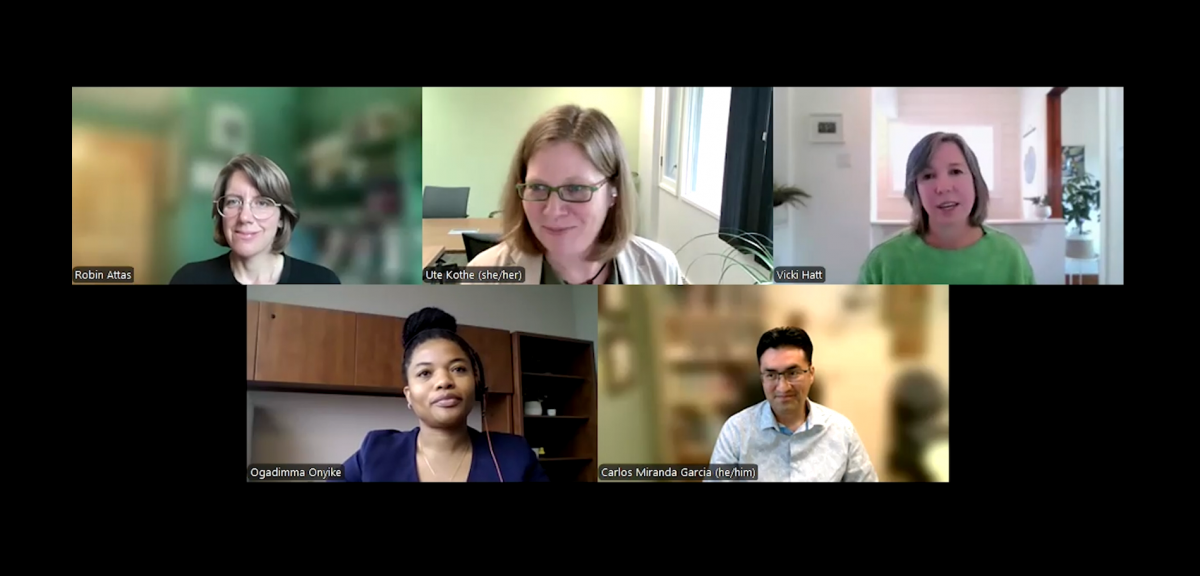
Homecoming 2024 Webinar panelists share strategies during the discussion.
On creating equitable and lifelong learning
Extended Education grad and staff share strategies at Homecoming Webinar
Learning has become a way of life for Ogadimma Onyike, Applied Business Management grad.
“No one will ever be too old to learn,” says the panelist at Extended Education’s recent Homecoming 2024 webinar.
“Lifelong learning has become a way of life for me. There is a need for us to constantly improve ourselves. We need the education system to keep up. Extended Education has provided a flexible education system that was suitable for my stage and is suitable for all stages in life.”
The title of the webinar, Futures of education: equity, inclusion and lifelong learning, refers to the concept of the evolution of education created by the United Nations Educational, Scientific and Cultural Organization (UNESCO), says moderator, Ute Kothe, Dean, Extended Education. “Yes. There are many futures. Education is key to addressing the needs of our changing society. Our education systems must be ready to tackle the challenges of the future. And, at Extended Education, we want to empower all learners, to break down barriers. We start with equity and create inclusive spaces.”
A warm smile
Onyike is an accomplished professional with credentials from Nigeria and the United Kingdom. She remembers attending the orientation for her UM studies and shares her experience.
The challenge for an international student is to adapt to the diversity of people from all around the world, she says. “It can be overwhelming, but when staff greet you with the greatest smile you have ever seen, you know it is going to be okay. Continue the warm smile. That first impression matters. I felt assurance we were in good hands. Later, I wanted to be the one offering that warm smile.”
A holistic approach
Education is about personal and professional growth, says panelist Carlos Miranda García- Personal Counsellor, Access and Aboriginal Focus Programs. “A holistic approach explores different parts of who we are- in heart, mind, body, and spirit.” The Access Program includes Indigenous and newcomer students. “They have different identities and stories, yet parallels can be drawn from those stories. Holistic principles encourage us to see interconnectedness in all things. “When students connect to themselves and their communities, they can also see this interconnectedness.”
Creating wrap-around supports and understanding there are different pathways to healing are essential, he says. “Supports like counselling provide a scaffolding for students as they come into their journey.”
For example, he remembers a student who was struggling with the possibility of becoming homeless, and wrap-around supports were able to quickly help them through. Also, many students have their doubts, struggling with imposter syndrome, but holistic support can help them to realize this is where they belong, he says.
EDIA
Panelist Robin Attas, Project Lead, UM Equity Diversity Inclusion Accessibility (EDIA) micro-certificate and Foundations course says, “Learners are human beings. Learning happens not just in the classroom. And you can’t learn if you are hungry, experiencing homelessness, or facing racism. EDIA reminds everyone we all have a role to play and more to learn.”
It’s important for educators to continually learn and adapt to the needs of their students, Attas says. “Each learner is unique. As educators, we should always strive to be better, more equitable, more fair, more inclusive in our teaching.”
She adds, “The UM EDIA program emphasizes competency development including not just content but skills and habits of mind. This empowers and motivate learners, whether UM staff, students, or faculty, to take action towards educational futures that better serve society, building capacity at the University of Manitoba for doing this important work.”
Community
Panelist Vicki Hatt, Instructor, Academic Language Support, shares highlights of some of the work she does. “We invite the elder to orientation and encourage students to bring their culture with them to their studies. We look at academic integrity and building a sense of community. Our setting up for success workshop includes experiential learning with meditation and a desk stretch to help relax students.”
Diversity
And we are learning in a diverse world, says Onyike.
“In Canada, all sorts of people are in our classrooms. I love how diverse we all are- in appearance, perspective, culture. We need to offer a variety of learning approaches to meet diverse needs, to prepare us for a complex multicultural workplace. When we learn that mindset, we ease effortlessly into the workplace.”






